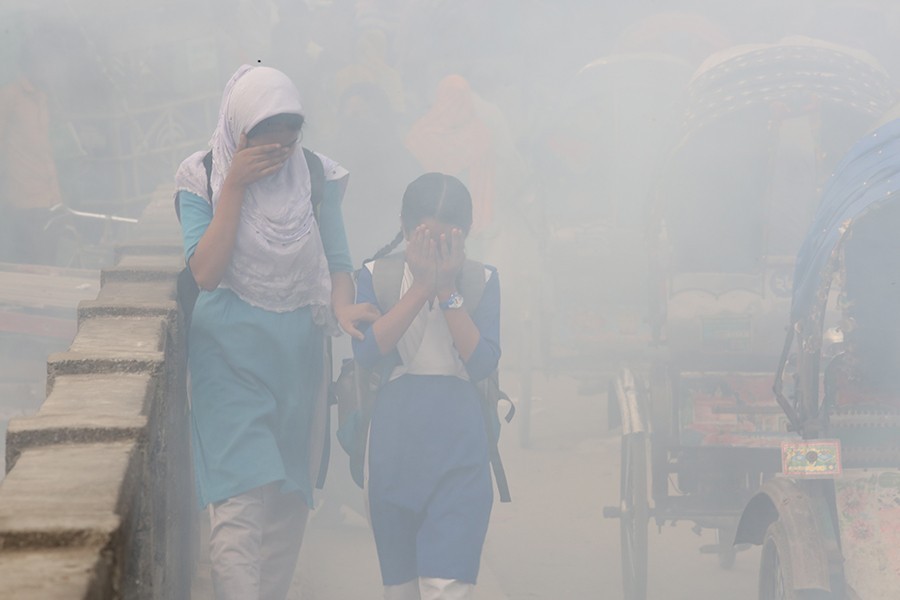The urban areas of Bangladesh, particularly Dhaka, witnessed a rapid increase in air pollution, particularly in dry seasons. Over the last three years, Dhaka has been repeatedly dubbed the most polluted city (AQI-US) globally. Besides, Dhaka consistently remained among the top 5 with emissions from brick kilns, rapid construction, and an increase in vehicle usage.
Exposure to air pollution has adverse health effects, with varying degrees of respiratory complications, e.g., asthma, lung inflammation, and cancer. While air pollution negatively affects Bangladesh's population in general, its impact is more prominent among the more vulnerable segments, i.e., pregnant women and children. Pregnant women exposed to common air pollutants are more likely to give birth prematurely and have small, low birth-weight children.
Consequent to the health impact, air pollution also affects the economy of Bangladesh. Health complications for adults result in increased sick days, reduction in productivity and for children result in time away from school and absence of participation in critical cognitive development activities, which have both short and long-term adverse effects on the national economy. Furthermore, as a result of rapid economic growth in urban areas, particularly Dhaka city, there is at present an increase in rural to urban migration which is expected to increase even further in the future.
In this backdrop, INSPIRA consultancy firm in collaboration with World Vision Bangladesh conducted a research that identified the following possible solutions to address urban air pollution:
First, create guidelines to control emissions from industries and identify green manufacturing practices.
While brick manufacturing is the biggest contributor (60 per cent) to air pollution in urban areas, other industries such as metal and cement production also have significant negative externalities. Even though issues with air quality are included in the Environment Conservation Act 1995 and the Environment Conservation Rules 1997, there is no stand-alone act currently dealing with deterioration of air quality as a result of industrial emissions.
Collaboration with industry experts, academicians and global industry representatives would be required to explore potential policy suggestions which would address specific components of the industrial process.
To note the challenges, interventions aimed at limiting or regulating industrial emissions through regulations will potentially incur monitoring costs at the producer level and may be met with resistance. Another point of resistance would be-- Bangladesh's emission levels compared to other countries is relatively insignificant and therefore does not require immediate interventions and a significant amount of our pollution comes from across the borders. However, environmentalists and academicians argue that the health burden as a result of inhaling emissions from industries and brick kiln manufacturers is of paramount priority, and therefore, requires immediate government attention.
Second, commissioning of an interactive app with an easy user interface for use by citizens in Bangladesh.
The app should be associated (to relevant degrees) with national bodies working in the field of air pollution. The app can be centrally managed by these national bodies and regularly provide people updates on air quality in their respective areas. There should also have a mechanism for everyday citizens to anonymously report various pollutants, emission sources, unauthorised waste sites, improper waste management to their local authorities who will be in a position to address those. The app can also have an interactive feature which allows members of specific communities to learn about activities to address air pollution in their own areas as well as show them the ways to participate. At the same time, social features should allow citizens to post their green activities and share ideas and green lifestyle tips with others in their area.
However, the study also came up with limitation of the suggested solutions. One common mistake is over-promising and trying to send in too much data too fast. Instead, a good starting point would be to set daily/weekly/monthly data dissemination schedules and advance the schedule as the technology advances. In the case of audience capacity, it is important to remember that the goal here is to inform the public and not force them into action. Third, promote hybrid and electric vehicles usage through technology transfer support and capacity development support.
About 95 per cent of all cars in the country at present in use are either reconditioned or used. Therefore, vehicular emissions, particularly from these vehicles ae a serious cause for concern. Rapid technology transfers can help inform members of the automotive industry towards making more environment-friendly decisions. And a focused approach at capacity development would promote inclusion of various underserved segments of the population.
Nevertheless, attempts at limiting the use of reconditioned vehicles may face initial resistance as a result of the high revenue earned by the government from this sector. Furthermore, majority of the automobile businesses in the country trade in reconditioned vehicles, and therefore significant resistance is expected.
In short, the process of addressing urban air pollution needs steadfast steps from multiple angles. There is a need for policy level interventions to curb the sources of pollutants. These should aim to adopt global best practices into the major polluting activities. Additionally, there is scope and need for mass public awareness on various components of air pollutants including sources, ways to curb emissions, ways to address existing pollutants, and adopt green lifestyles. These programmes should aim at informing the population and bringing about lasting behavioural change. Lastly, there needs to be a more coherent national level shift towards greener and environment-friendly practices. This also requires capacity development at all levels including the bottom tier income groups so that greener alternatives become more accessible for all people.
Bipasha Dutta is Manage, Strategy, Innovation and Knowledge Management, World Vision Bangladesh. [email protected]


